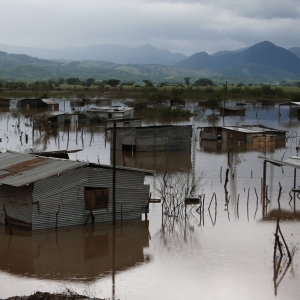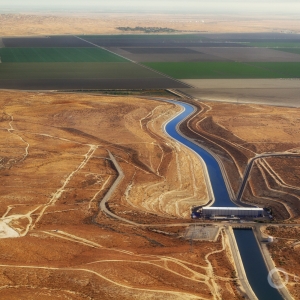Federal Water Tap, March 22: USGS Study Finds Drought Increases Risk of Arsenic in Private Wells
The Rundown
The Senate confirms Rep. Deb Haaland as the Interior secretary. The Army Corps suspends a Clean Water Act permit for a proposed Minnesota mine. A State Department official urges China to be transparent about its use of water from the Mekong River. The EPA seeks more data on PFAS in industrial wastewater discharges. A House bill would authorize $50 billion for wastewater infrastructure. The Interior Department will hold a public forum on its oil and gas leasing program. The House and Senate hold hearings on green infrastructure, water infrastructure needs for Native communities, PFAS cleanup, and clean energy. House Democrats ask for water shutoff protections in an infrastructure bill. A USGS study finds that drought increases the risk of arsenic in private wells. And lastly, at the end of winter snowpack in the western states is both a hit and a miss.
“After all, is it truly possible to have life, liberty, and the pursuit of happiness if we don’t have clean water? The answer is ‘No.’ But, sadly, the reality for far too many communities around our country is that they don’t have reliable access to water that is essential for daily life.” — Sen. Tom Carper (D-DE) in introductory remarks at a Senate Committee on Environment and Public Works hearing on water and sewer infrastructure.
By the Numbers
51 to 40: Margin by which the Senate voted to confirm Rep. Deb Haaland of New Mexico as the secretary of the Department of the Interior. Four Republicans joined the Democrats in voting ‘Yes.’ Three Democrats did not vote. A member of Laguna Pueblo, Haaland becomes the first Native American cabinet member, leading a department that, among other duties, manages federal lands and waters in the West.
$42.4 million: Grant funding allocated by the Bureau of Reclamation to conserve water in the western states. Provided through the WaterSMART program, the grants will support 55 projects that range from lining canals and upgrading irrigation equipment to installing advanced water meters that allow customers to see real-time water use.
55,519: Number of waterways reviewed by the Army Corps of Engineers since June, when the Trump administration’s definition of the scope of the Clean Water Act took effect. Of the streams that were reviewed, more than 72 percent (40,081) did not merit federal protection, according to data obtained by E&E News.
News Briefs
EPA Seeks PFAS Discharge Information
To inform potential regulations, the U.S. Environmental Protection Agency is seeking information from the industrial sector on PFAS discharges in wastewater.
The agency identified six facilities in the country that manufacture PFAS and have wastewater discharges. It is looking for information on other facilities, the types and volumes of PFAS that are produced, the wastewater treatment processes that are used, and the methods for analyzing the compounds in wastewater.
Water Bills in Congress
- The bipartisan Water Quality Protection and Job Creation Act would authorize $50 billion over five years for wastewater infrastructure. The bill does so through a mix of grants, loans, and pilot projects, including reauthorizing the Clean Water State Revolving Fund at $8 billion a year. Remember, though: authorizations do not necessarily equal appropriations.
- Sen. Cindy Hyde-Smith (R-MS) introduced a bill that would provide at least $47 million in federal funds for the Jackson, Mississippi, water system, which was damaged in a pair of winter storms in February that resulted in a month-long boil-water advisory.
- The Water Rights Protection Act, introduced by Republican senators, would prevent the federal government from requiring the transfer of water rights as part of a permit or easement agreement. The bill has been introduced several times in response to a 2011 U.S. Forest Service proposal, later withdrawn, that would have required ski resorts operating on public land to transfer their water rights to the U.S. government.
Minnesota Mine Permit Suspended
The Army Corps of Engineers suspended a Clean Water Act permit for the contested PolyMet mine in northern Minnesota, the Duluth News Tribune reports.
The permit allows the proposed copper-nickel mine to dredge and fill in wetlands. The suspension is due to an EPA review of the mine’s potential impacts on the waters of the Fond du Lac Band of Lake Superior Chippewa, whose reservation is located downstream. The band sued the EPA in September 2019, arguing the agency did not complete a proper analysis.
Mekong Dialogue
A State Department official remarked on the urgency of climate change and water management for the Mekong region, asserting that China should be transparent about its use of water from the river.
“Beijing should provide the accurate, timely, and essential data that Mekong-region countries are calling for, and should consult with its neighbors on PRC dam operations that so severely impact water quantity and quality downstream” Atul Keshap said.
Keshap, the principal deputy assistant secretary in the Bureau of East Asian and Pacific Affairs, spoke at the Mekong-U.S. Partnership Track 1.5 Policy Dialogues, a series of conferences hosted by the Stimson Center and the International Union of Nature that will address key issues in the region.
Studies and Reports
Snow Drought Update
Near the end of winter, snowpack in the western states is both a hit and a miss, according to federal measurements.
The hit is in the northern tier, where the Cascades, Olympics, and northern Rockies are at or above the historical median.
The misses are in the Southwest and Sierra Nevada.
Altogether, two-thirds of snowpack monitoring stations are below the historical median.
Drought and Arsenic Exposure from Private Wells
The number of people potentially exposed to arsenic in drinking water from private wells is estimated to grow by 50 percent during drought, according to a U.S. Geological Survey study.
Drought can cause naturally occurring arsenic to be released from subsurface minerals and soils into groundwater. The study used eight computer simulations that modeled differences in precipitation and recharged.
The number of people with higher risk of being exposed to arsenic in their well water above the EPA drinking water standard rises from 2.7 million to 4.1 million during drier conditions, the study found. The biggest increase in risk is in southern Texas, Florida, and the Midwest.
The researchers note that the study conveys geographical averages and does not represent the risk for any individual well.
On the Radar
Interior’s Fossil Fuel Review
The Interior Department will host a public forum that will inform a review of its oil and natural gas leasing program, as called for in President Biden’s Executive Order 14008.
The forum will be livestreamed from 1:00 p.m. to 4:00 p.m. Eastern on March 25. You can also register to view the event on Zoom.
Reps. Ask for Shutoff Protections in Infrastructure Bill
Reps. Rashida Tlaib and Debbie Dingell, both Democrats from Michigan, asked President Biden to include water access provisions in any infrastructure package.
Thirty-two members of Congress signed the letter, which requests that utilities not be allowed to disconnect water service during the Covid-19 public health emergency and that $1.5 billion be allocated to help low-income households pay their water bills. Tlaib and Dingell earlier this year introduced a bill in the House with the same provisions.
In context: The Pandemic’s Unequal Impact on North Carolina Water Utilities and Their Customers
House Hearings
- The House Energy and Commerce Committee will discuss the LIFT America Act, a bill intended to modernize the country’s infrastructure. The bill would increase authorized funding for the Drinking Water State Revolving Fund to $5.5 billion annually by 2024. It would also authorize $500 million a year in grants for the capital cost of treatment works to remove PFAS in drinking water of low-income communities. The hearing is on March 22 at 11:00 a.m. Eastern.
- The House Transportation and Infrastructure Committee will review the status of key provisions in the Water Resources Development Act of 2020 on March 23 at 11:00 a.m. Eastern.
- The House Appropriations Committee will hold a hearing on PFAS impacts and remediation on March 24 at 2:00 p.m. Eastern.
- The House Energy and Commerce Committee will hold a hearing on the CLEAN Future Act, a wide-ranging climate and energy bill that has a number of touchpoints to water, many of which are also a part of the LIFT America Act (see above). The hearing is on March 24 at 2:00 p.m. Eastern.
Senate Hearings
- The Senate Energy and Natural Resources Committee will discuss the use of natural systems in western water management on March 24 at 2:30 p.m. Eastern.
- The Senate Indian Affairs Committee will hold a hearing on water infrastructure needs for Native communities on March 24 at 2:30 p.m. Eastern.
Electric Systems and Extreme Weather
The Federal Energy Regulatory Commission will host a technical conference on June 1-2 to discuss threats to the nation’s electric generation and transmission systems from climate change and extreme weather.
Federal Water Tap is a weekly digest spotting trends in U.S. government water policy. To get more water news, follow Circle of Blue on Twitter and sign up for our newsletter.
Brett writes about agriculture, energy, infrastructure, and the politics and economics of water in the United States. He also writes the Federal Water Tap, Circle of Blue’s weekly digest of U.S. government water news. He is the winner of two Society of Environmental Journalists reporting awards, one of the top honors in American environmental journalism: first place for explanatory reporting for a series on septic system pollution in the United States(2016) and third place for beat reporting in a small market (2014). He received the Sierra Club’s Distinguished Service Award in 2018. Brett lives in Seattle, where he hikes the mountains and bakes pies. Contact Brett Walton






Leave a Reply
Want to join the discussion?Feel free to contribute!